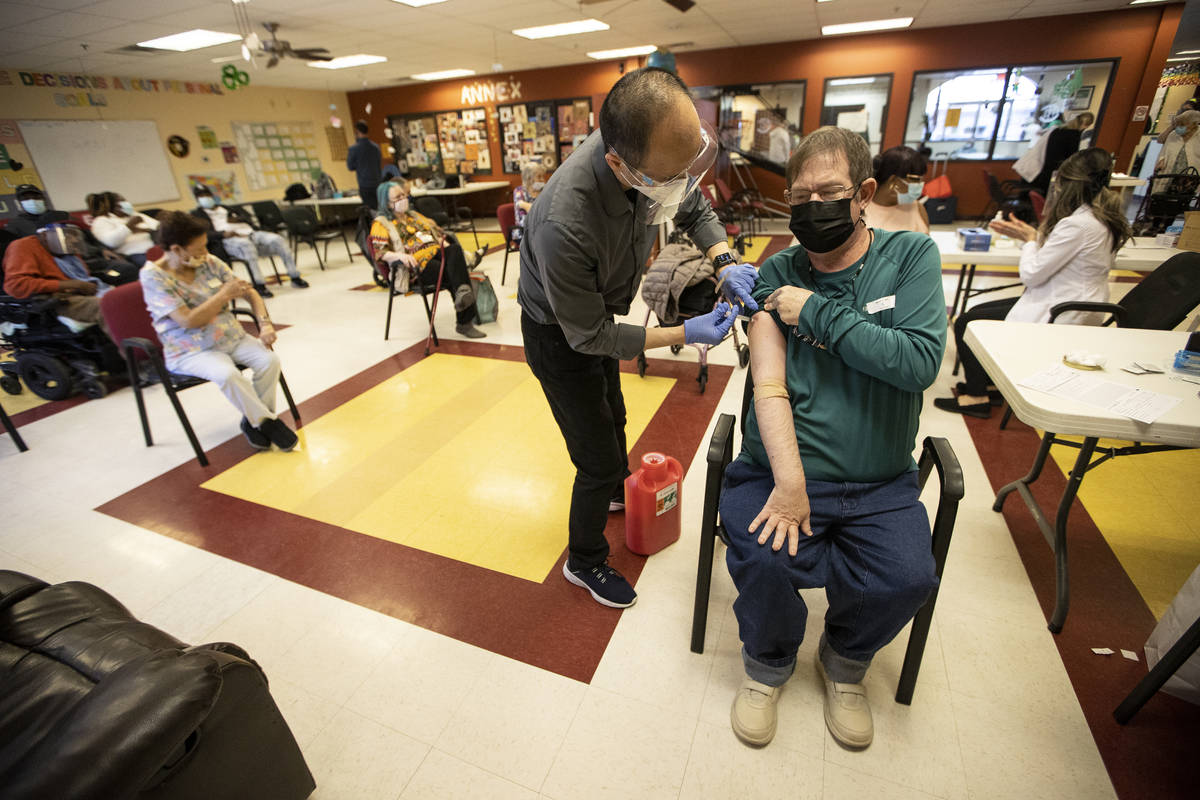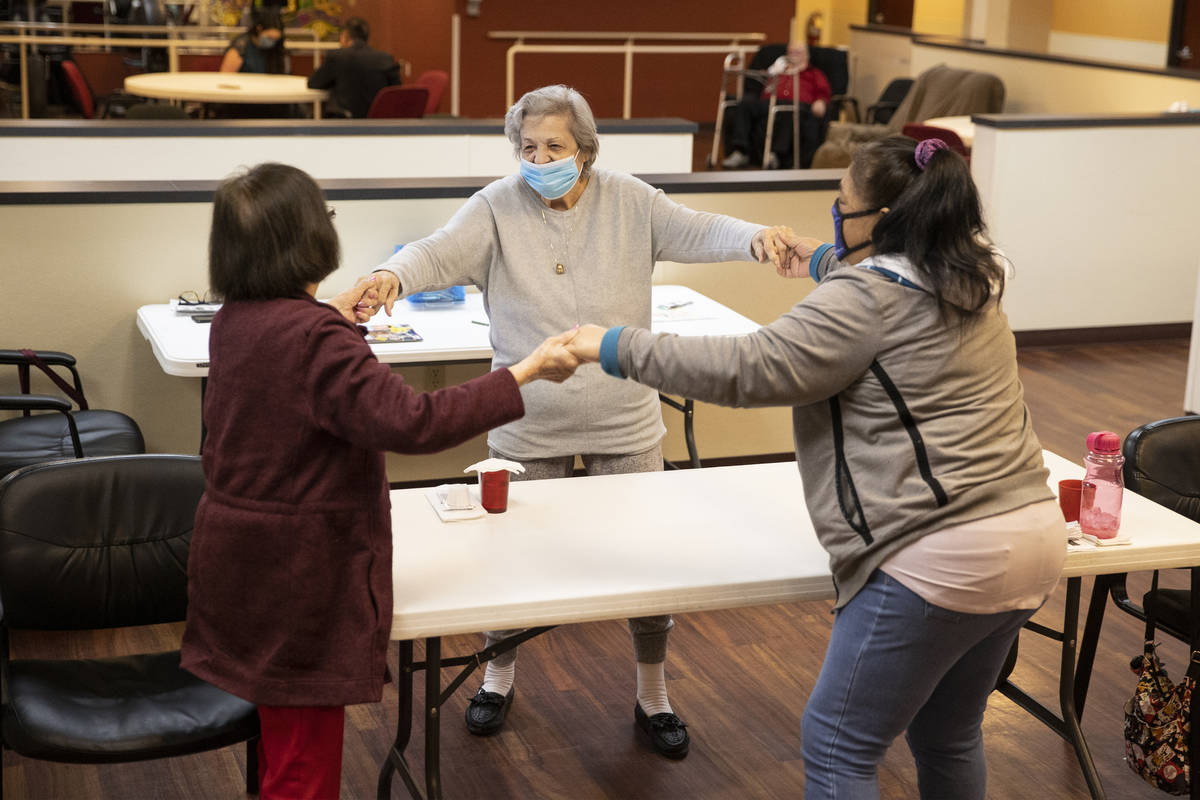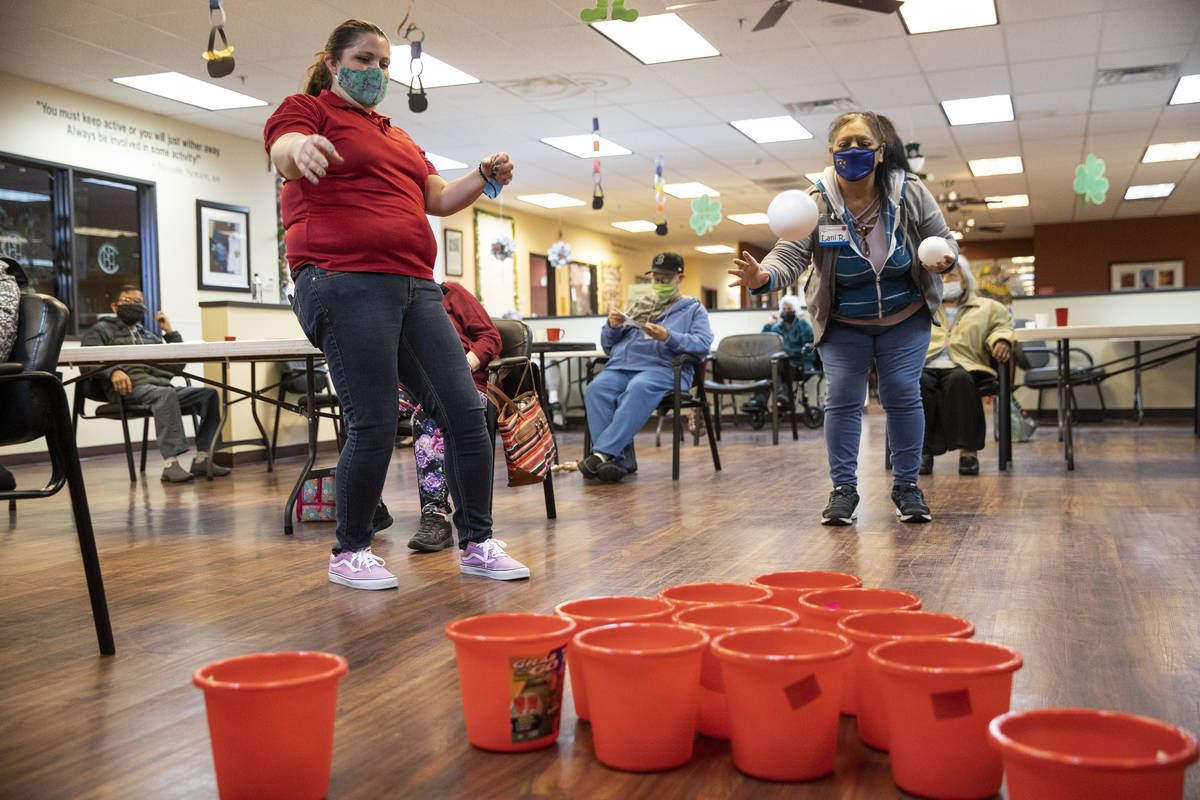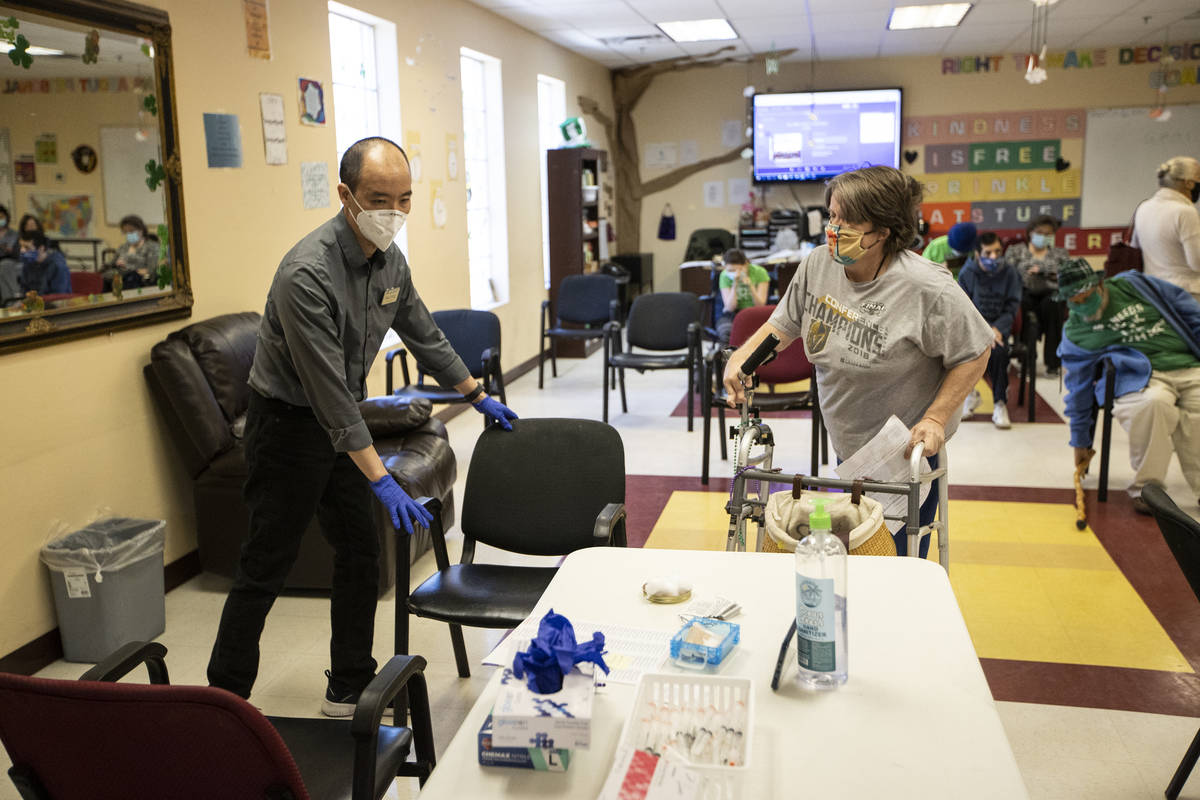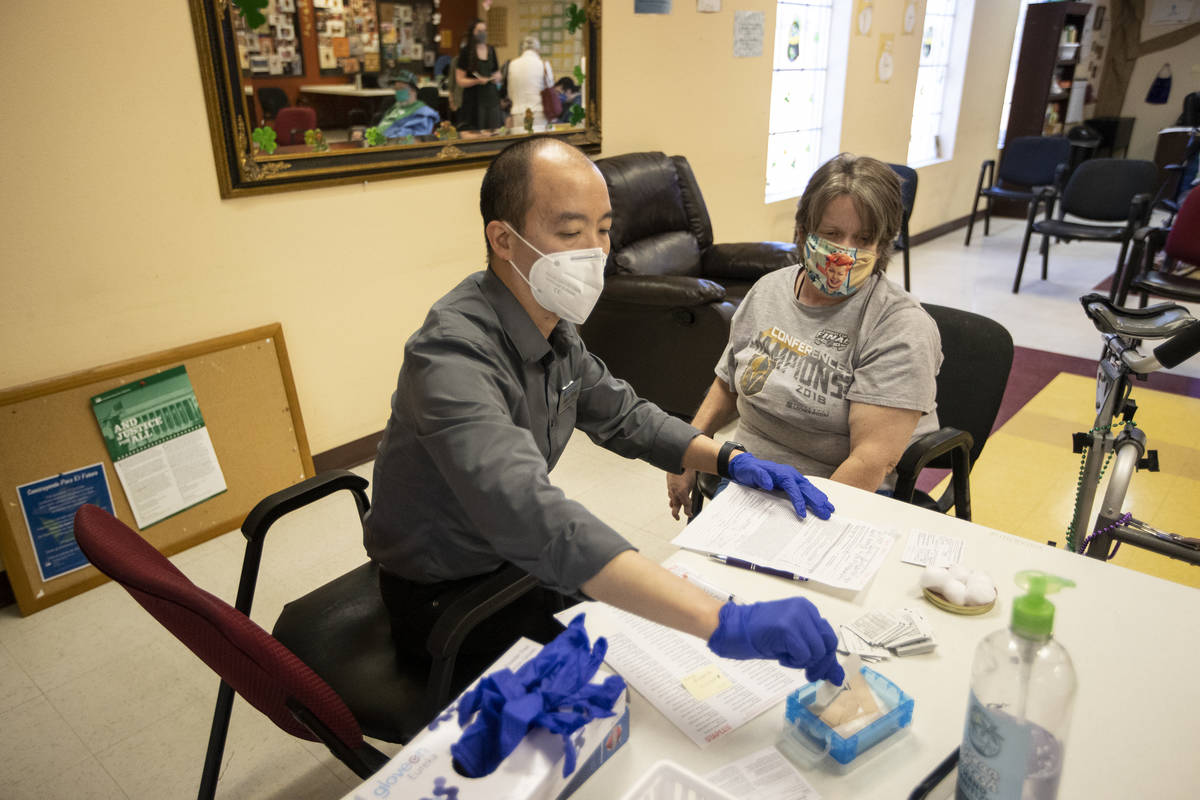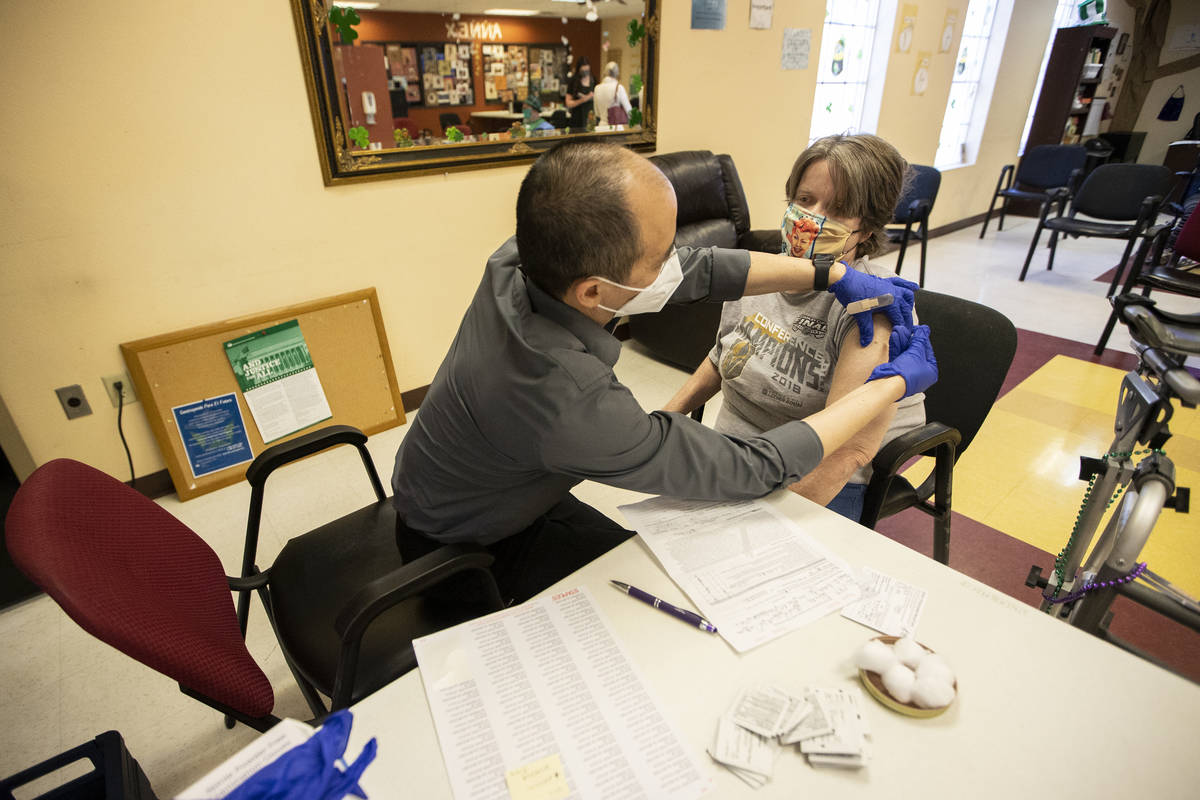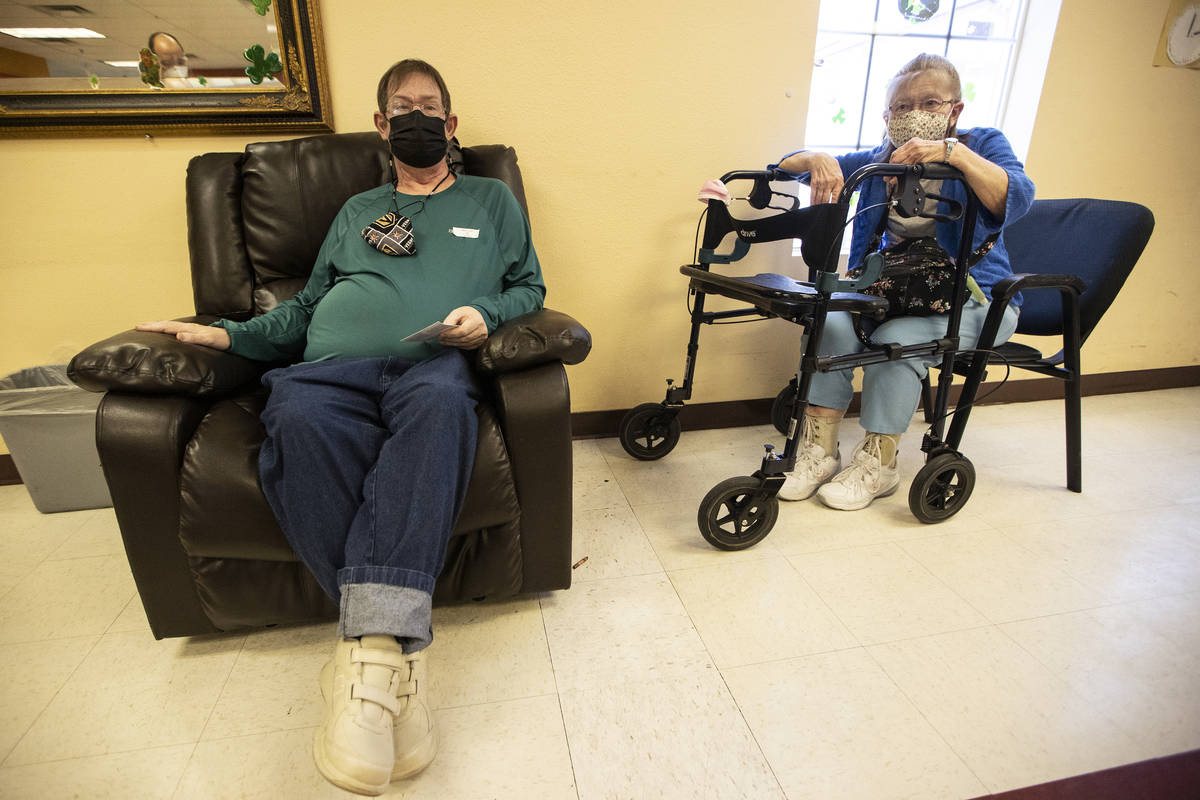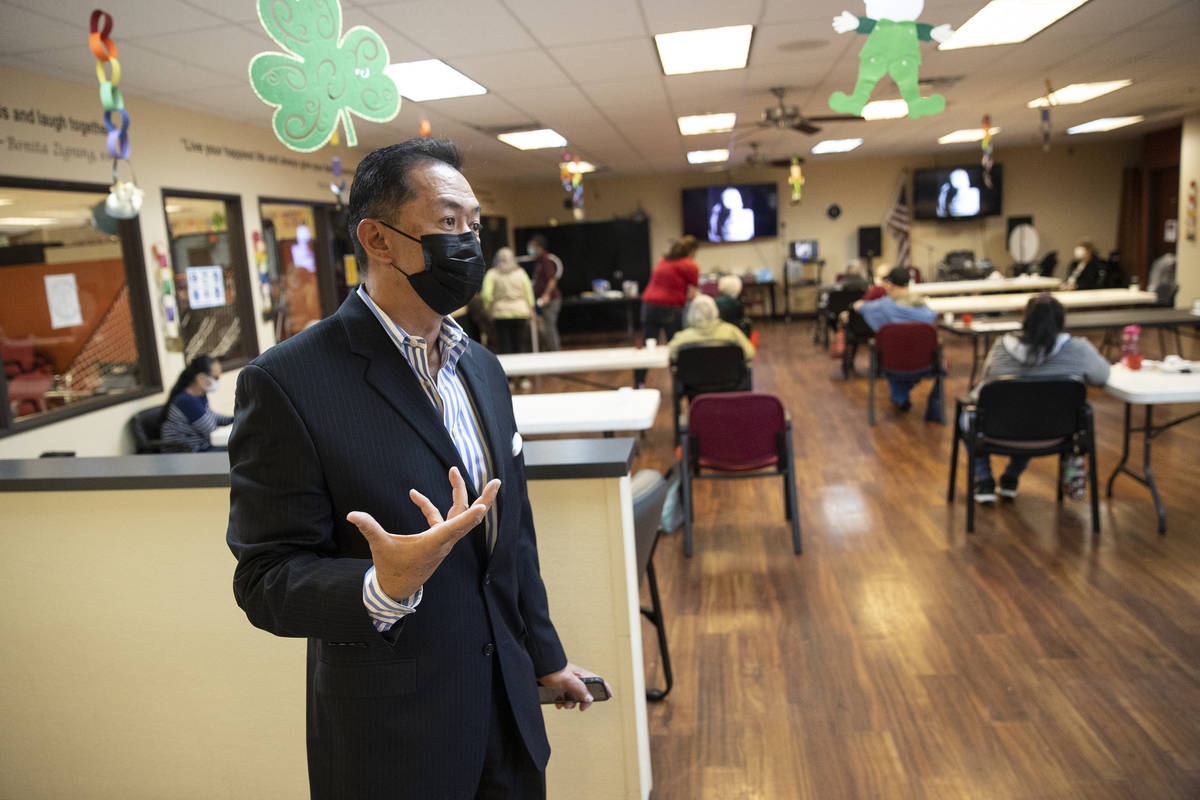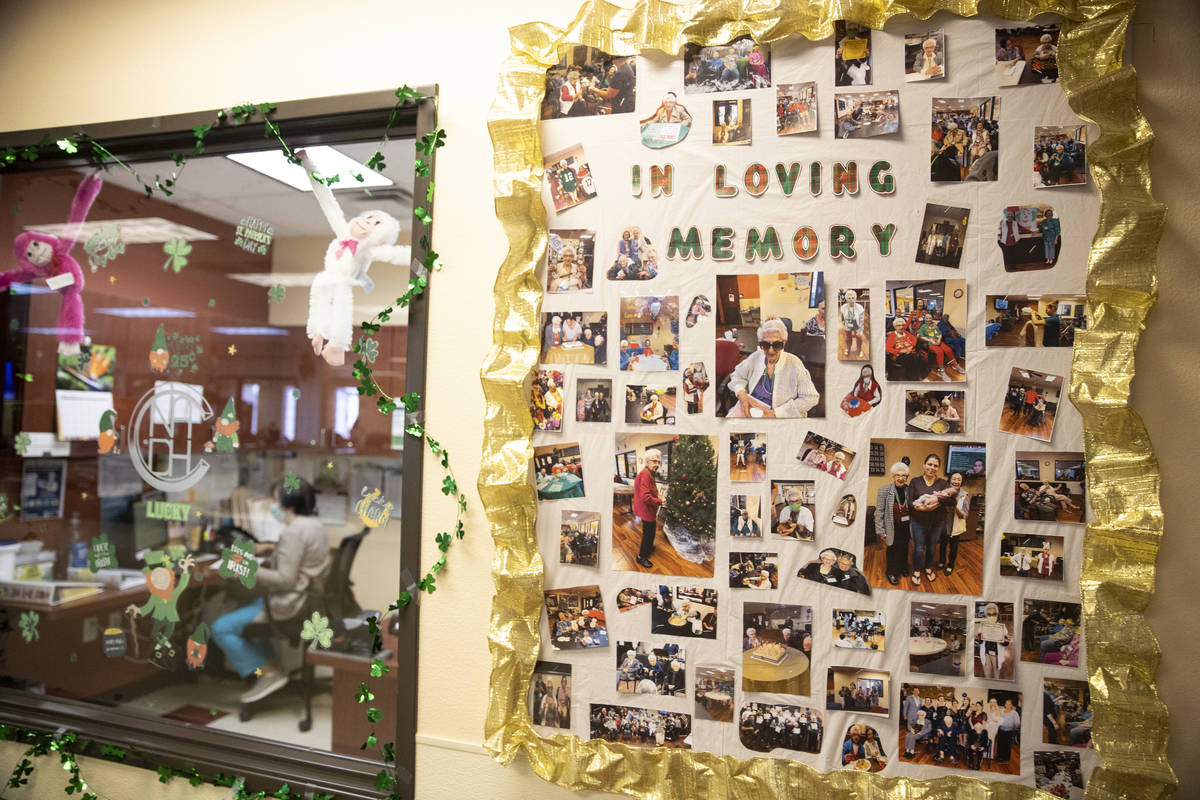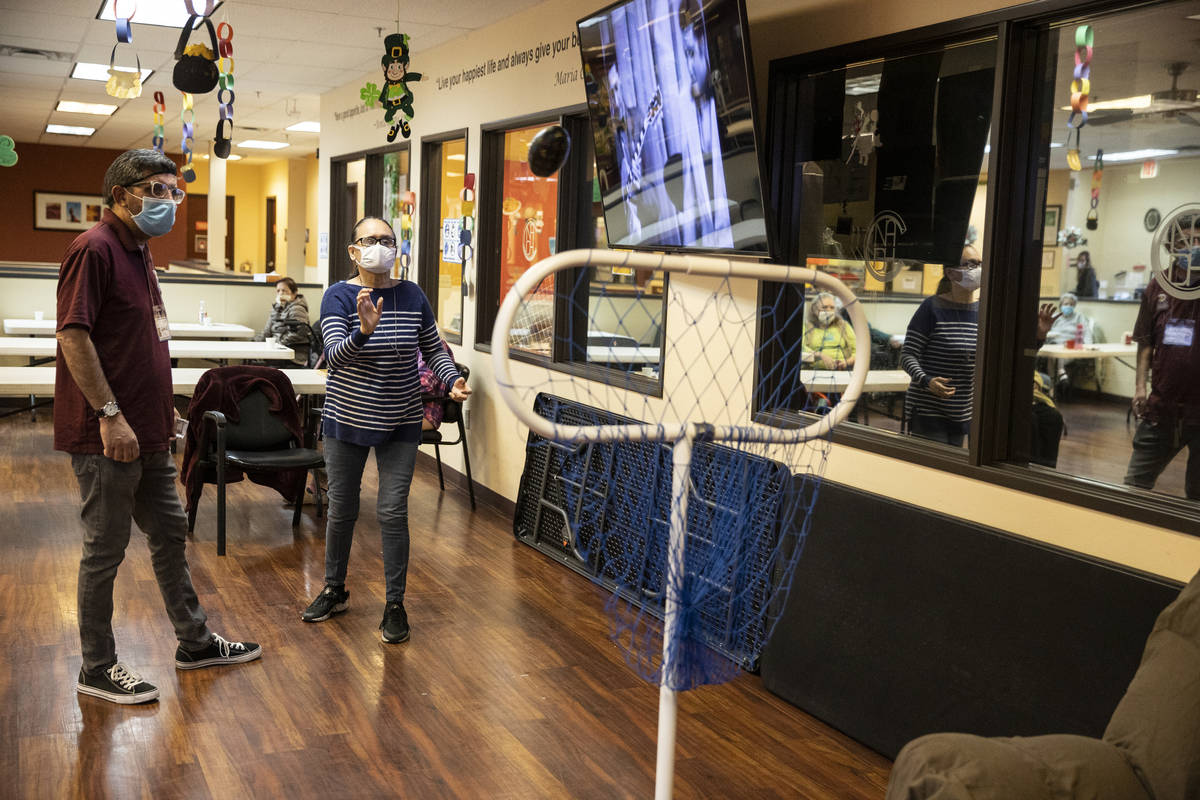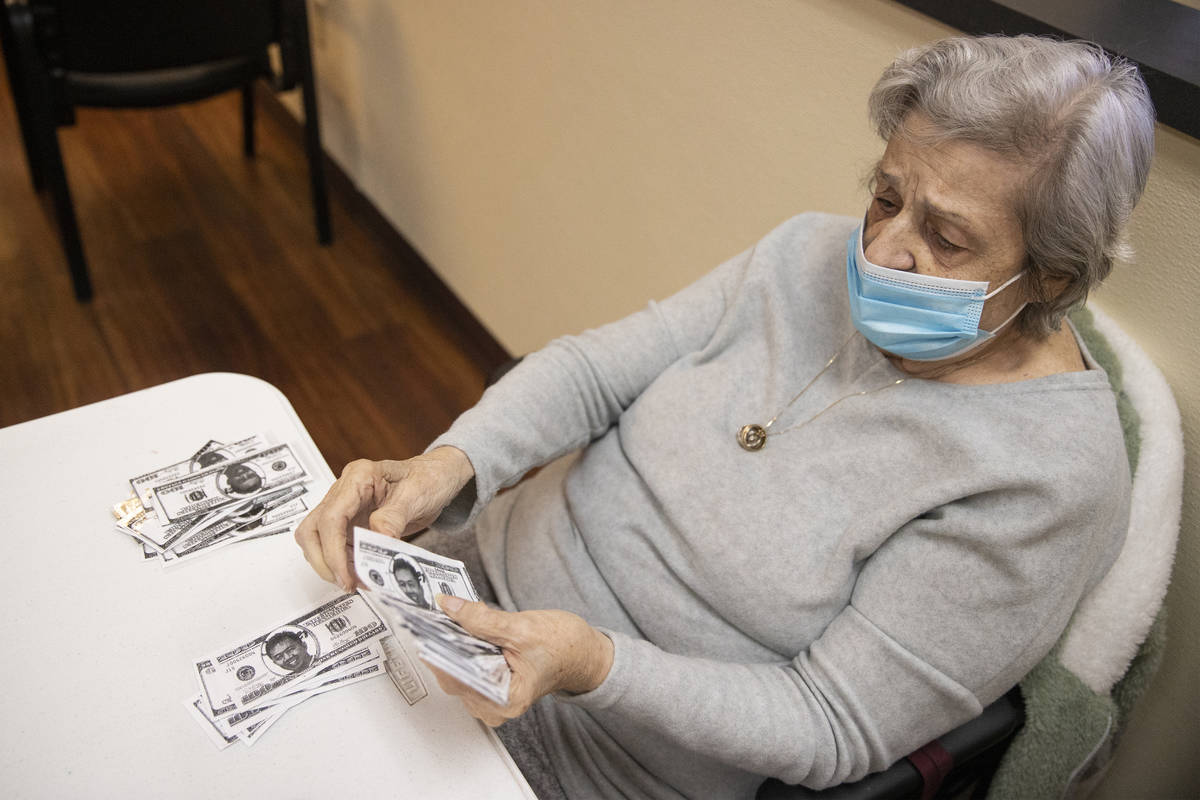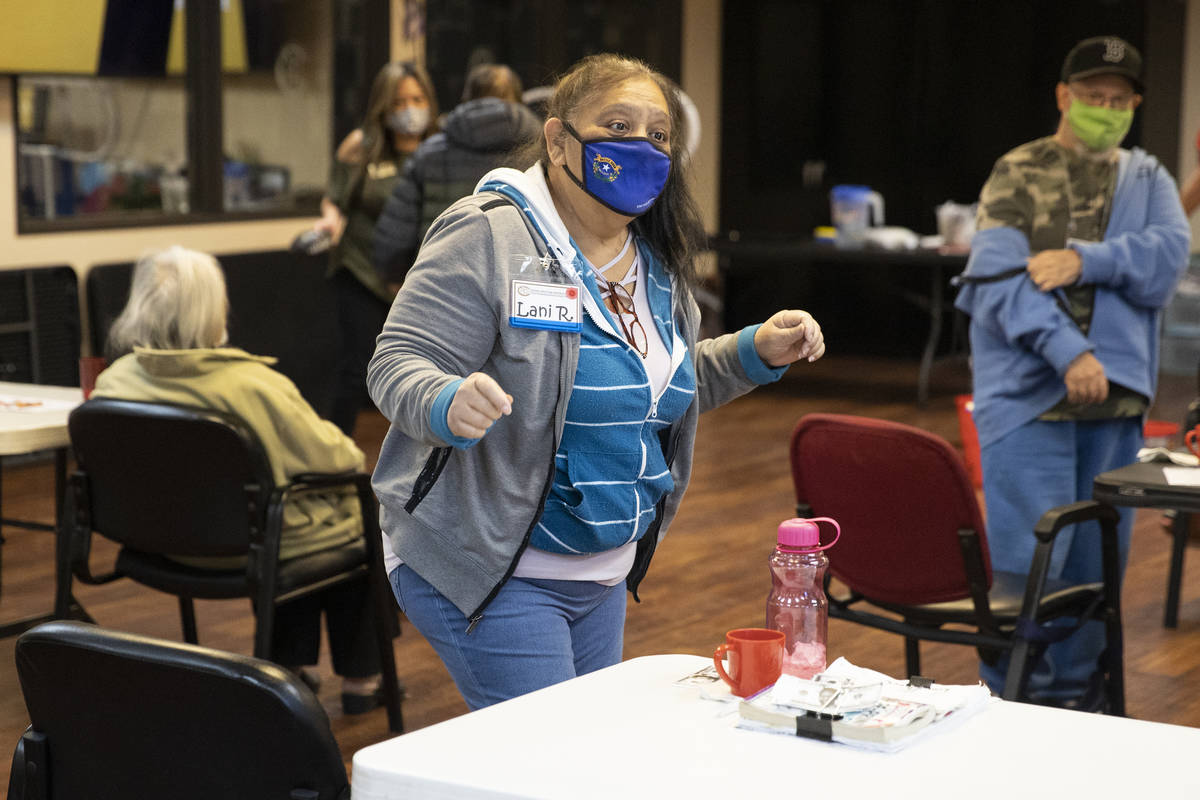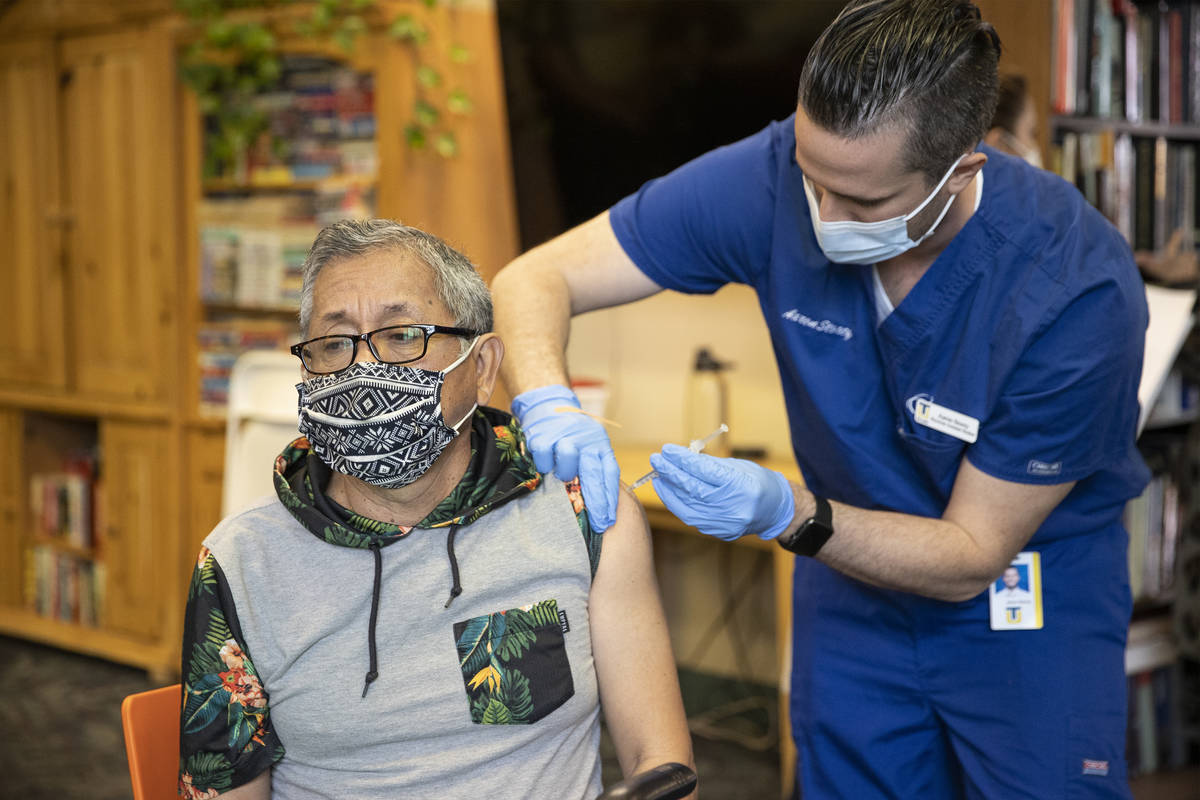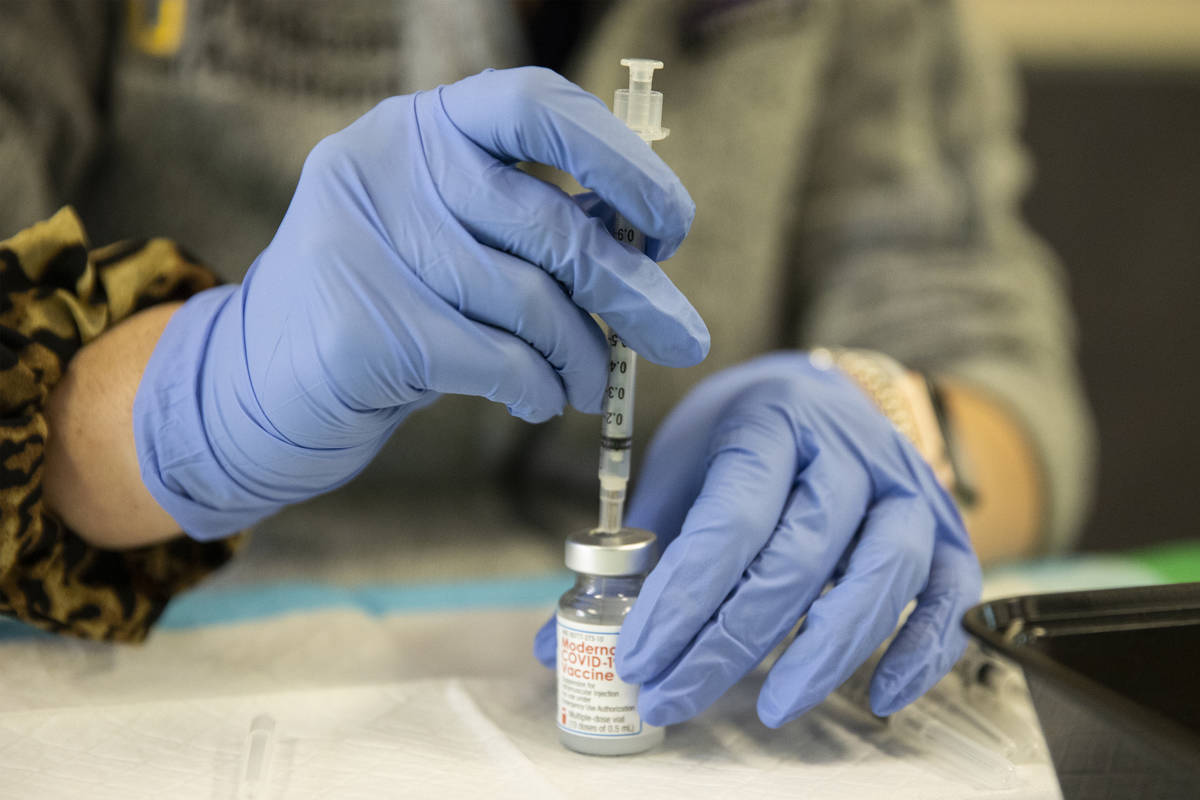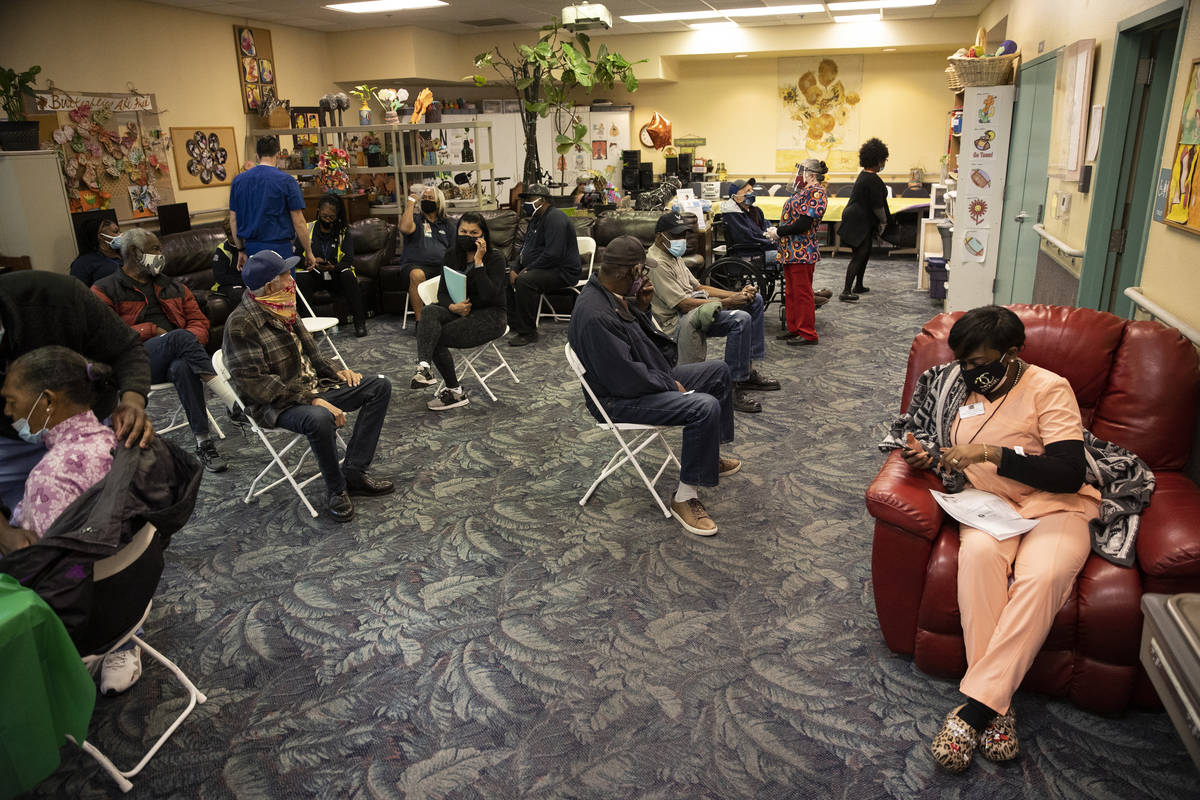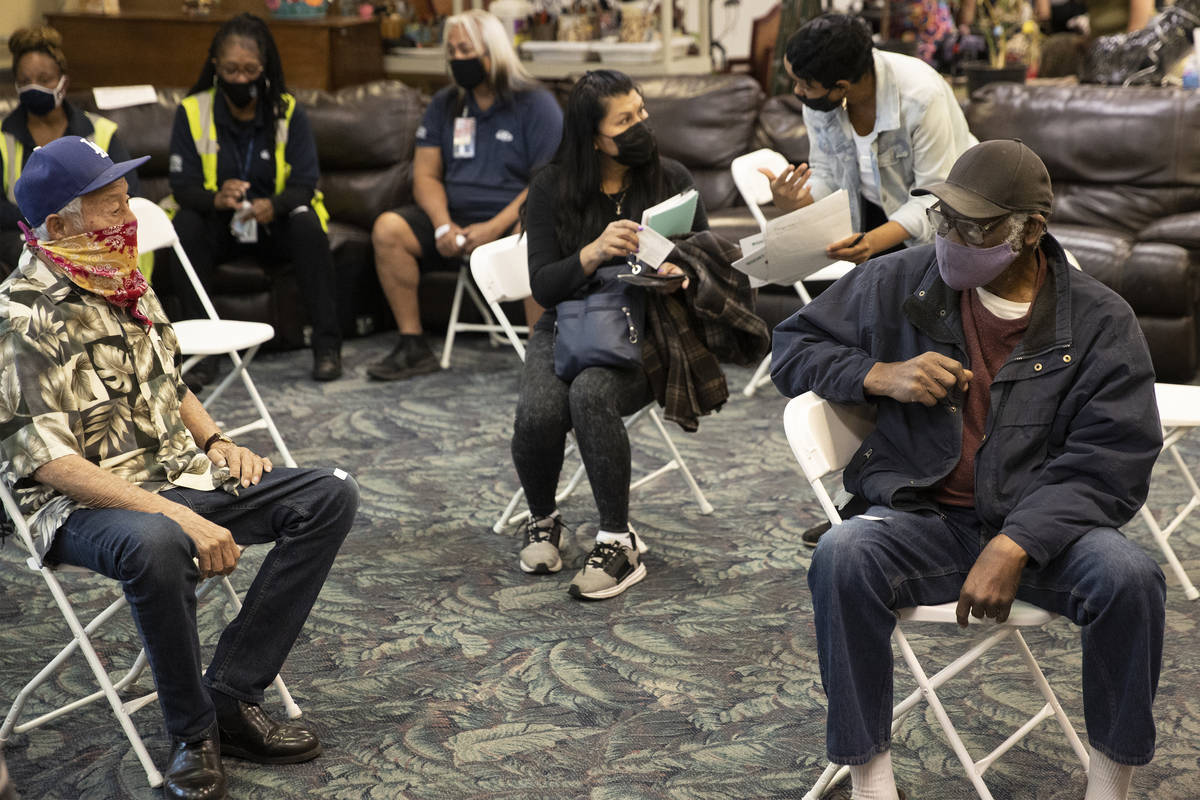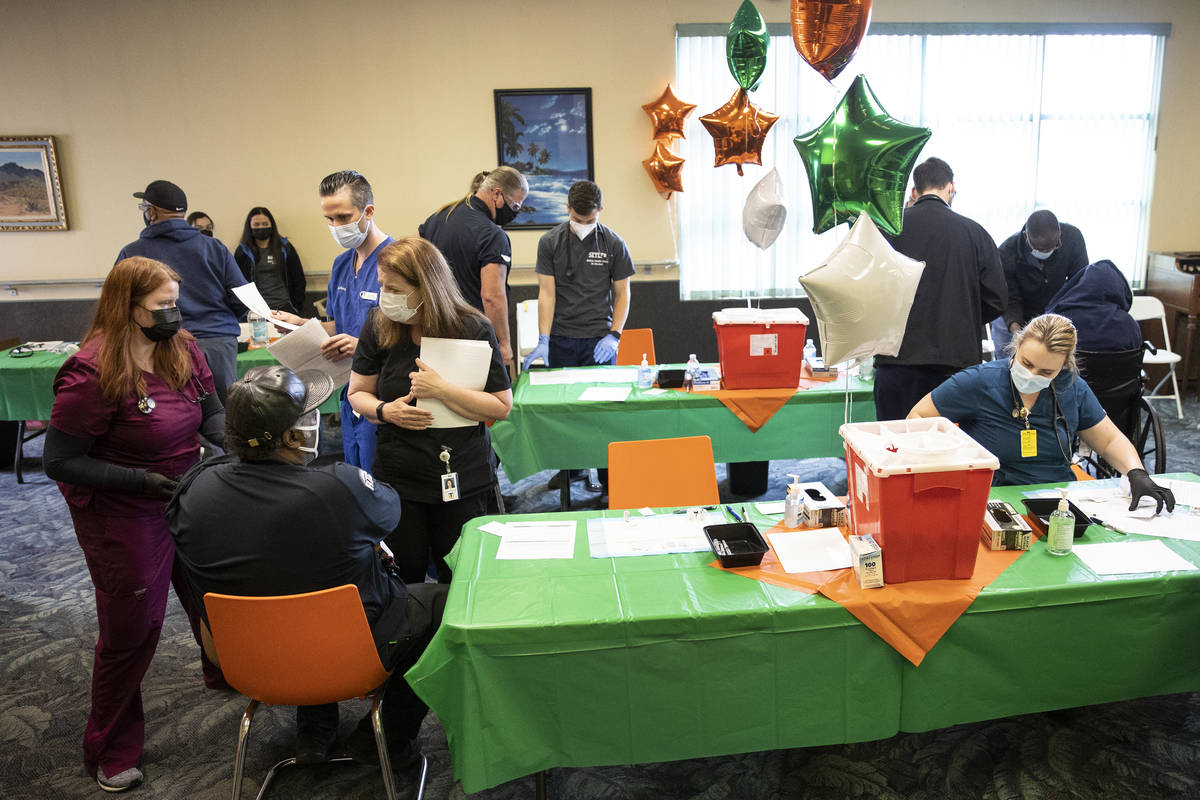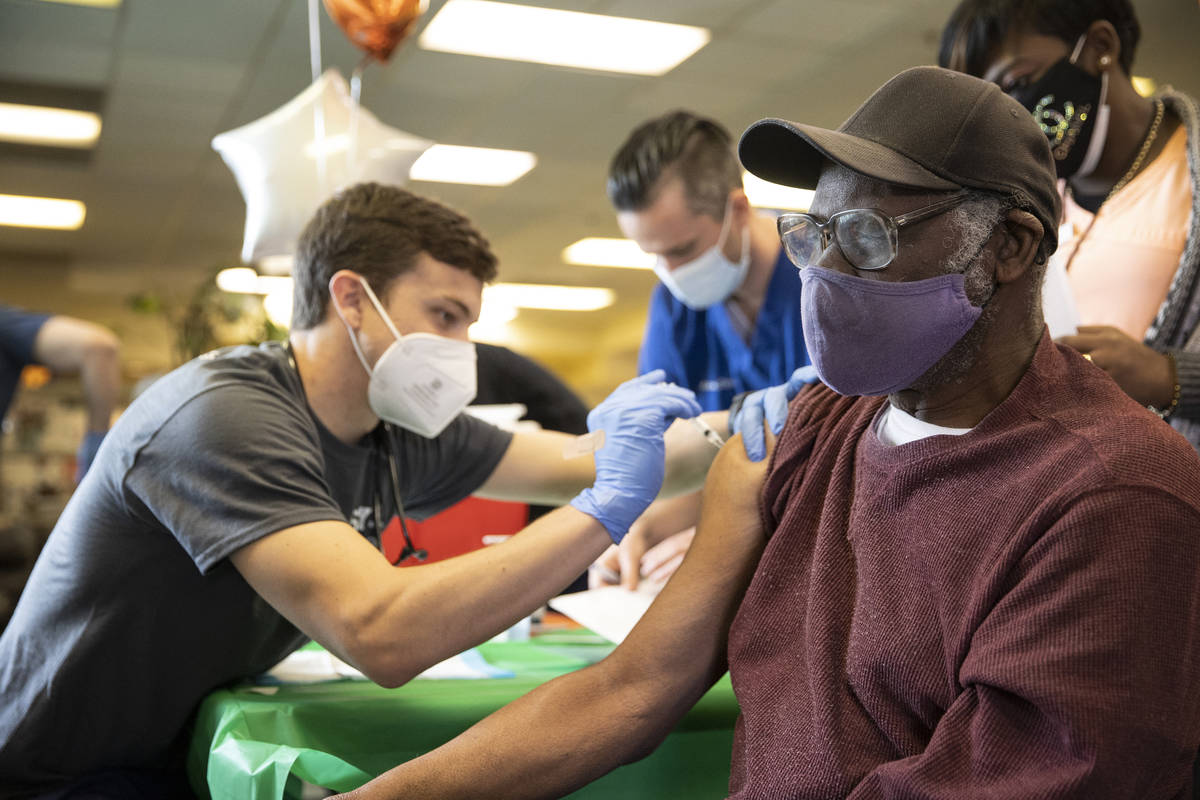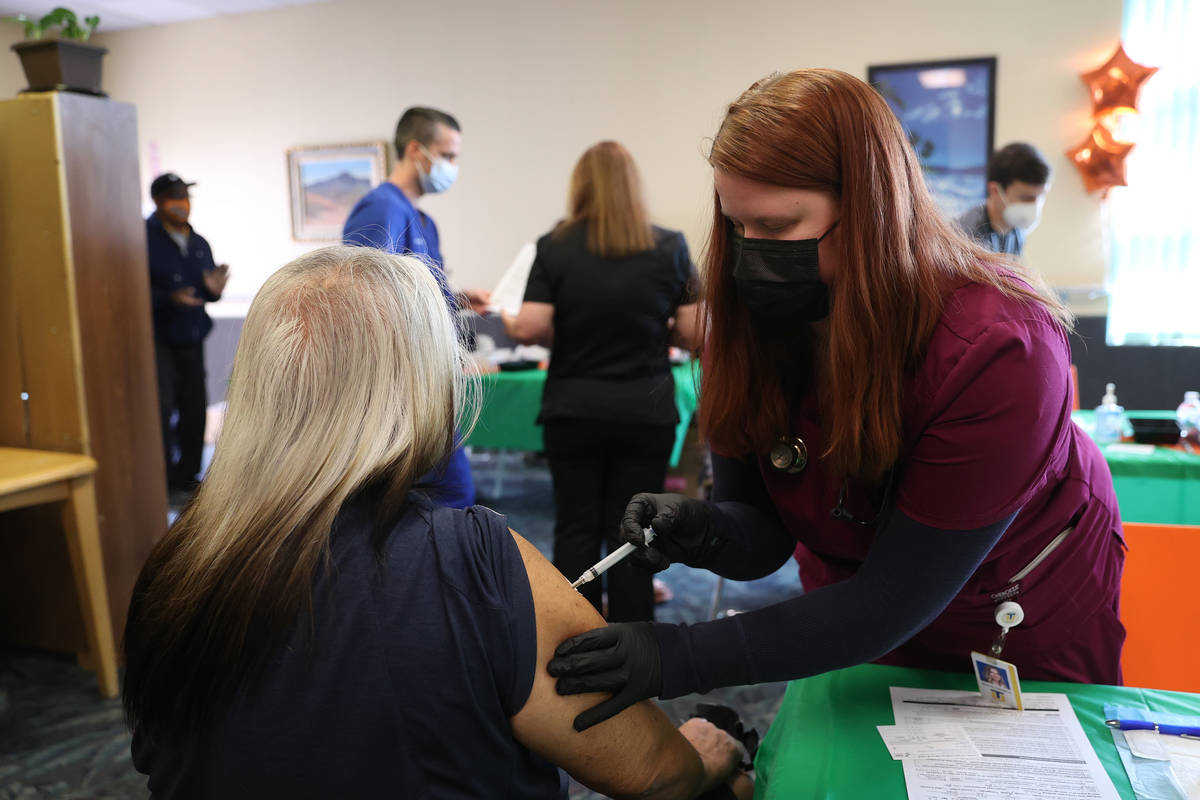Las Vegas adult day cares face struggles during pandemic
Aida Grasman stopped bringing her 39-year-old son to his adult day care center a year ago when the COVID-19 pandemic began to take off in Southern Nevada, fearing for his safety in the group facility. Now she’s excited about his impending return to a setting where he can interact with friends.
A crucial piece to making that happen was getting him vaccinated against the coronavirus.
Her son, Alexander Hammerstein, has a rare genetic condition called Coffin-Lowry syndrome, which the National Institute of Neurological Disorders and Stroke says typically includes “craniofacial (head and facial) and skeletal abnormalities” and “delayed intellectual development.”
He received his second dose of the vaccine on March 17 — St. Patrick’s Day — at the Nevada Adult Day Healthcare Center on Eastern Avenue in Las Vegas.
The setting was an on-site clinic run by Albertsons pharmacy personnel for center employees as well as clients.
Grasman, 71, said her son was happy to see his friends and staff for the first time in a year while getting his shots.
“It’s a familiar place for him, so he’s comfortable,” she said. “It’s a blessing that he got it here.”
Adult day care plays a critical role for families with seniors, disabled younger adults or those suffering from Alzheimer’s disease and other forms of dementia, allowing them time for work or other activities.
But despite serving many high-risk clients and being allowed to stay open during the pandemic, Las Vegas-area adult day care centers have faced challenges in getting access to COVID-19 vaccine for their clients and employees.
‘Everyone was scrambling’
“Of course, everyone was scrambling and trying to position themselves to get the vaccine,” said Christopher Vito, president and CEO of Nevada Adult Day Healthcare Centers, referring to the period after it became clear that the adult day cares were not included in a federal pharmacy partnership aimed at providing vaccine to long-term care facilities that began in mid-December.
He contacted Southern Nevada Health District for help, and while he was awaiting a response Albertsons reached out about scheduling on-site vaccination clinics at each of the company’s three Las Vegas Valley facilities.
“It’s a huge help for us,” he said.
Vito said he’s not faulting anyone, but he didn’t hear from the health district until a week after Albertsons provided the first clinic in February. That was about 1½ months after he requested help, he said.
Jeffrey Klein, president and CEO of Nevada Senior Services, a nonprofit that runs two Las Vegas-area adult day care centers, said he initially thought the organization would qualify for the federal program, even though they aren’t technically long-term care facilities.
His reasoning: They are congregate settings similar to nursing homes, but “where people go home at night,” Klein said. He soon learned that they were not included in the program.
Adult day care centers weren’t the only state-regulated facilities ineligible to participate in the program managed by the Centers for Disease Control and Prevention.
Of about 1,500 licensed care facilities or agencies in Nevada, more than 1,000 weren’t eligible for the federal pharmacy partnership, according to state Department of Health and Human Services (DHHS) data obtained by the Review-Journal through a public records request. They include home health care providers, hospice care facilities and alcohol or drug abuse treatment facilities.
There are nearly 40 centers licensed in Nevada as facilities “for the care of adults during the day,” according to the state, with some entities operating multiple facilities.
The state’s plan to get vaccine to the facilities that didn’t qualify called for them to “be reached through (a) pharmacy or locally coordinated clinical strike teams,” DHHS spokeswoman Shannon Litz said in an email to the Review-Journal. The Nevada State Board of Pharmacy has worked to coordinate on-site clinics, she said.
But Southern Nevada Health District spokeswoman Jennifer Sizemore said in an email last week that district officials were told the state and Board of Pharmacy “partnered with pharmacies to provide vaccines to these groups” and thus didn’t muster strike teams to visit such facilities.
How the grocer got involved
Both the Nevada Adult Day Healthcare Centers and Nevada Senior Services, which between them operate five adult day cares in Southern Nevada, ultimately were able to hold vaccination clinics in February or early this month with the help of pharmacy staff from the Albertsons grocery chain.
The State Board of Pharmacy reached out to Albertsons to seek assistance in providing the on-site COVID-19 vaccinations for some facilities that didn’t qualify for the federal program, said Mike Halle, pharmacy district manager for Albertsons and Vons in Southern Nevada.
Albertsons receives vaccine through the federal pharmacy program — which is used for in-store immunizations — and from the county, which is being used at care facilities that didn’t qualify.
So while neither Nevada Senior Services not Nevada Adult Day Healthcare Centers immediately heard back from the government, doses from the health district’s vaccine allotment were fueling the clinics at their facilities.
As of Friday, Albertsons has provided 64 clinics and administered more than 3,500 doses at care facilities in Southern Nevada, including adult day care centers and senior living facilities.
Halle said strike teams have reached about 45 facilities, some of which were small and had as few as eight or nine people to vaccinate.
Halle said clinics and care facilities are being added every week, with some facilities reaching out directly to Albertsons and the grocer seeking state permission to give vaccine when it hears hears of a facility in need.
Meanwhile, hundreds of Nevada long-term care facilities have received on-site COVID-19 shots provided by CVS Health, Walgreens or Consonus Pharmacy through the federal program. Vaccinations began Dec. 21 for skilled nursing facilities and Jan. 4 for assisted living and other care facilities, and the process for all facilities is nearly done.
And earlier this month, Gov. Steve Sisolak announced all Nevadans 16 and older will become eligible to get vaccinated starting April 5.
Roy Afflerbach, public policy adviser to the National Adult Day Services Association, said he wasn’t surprised that adult day care centers weren’t included, given that attention was focused on the large number of deaths in residential facilities.
Adult day care facilities aren’t residential or well defined, Afflerbach said, noting there’s no common definition among U.S. states or a federal definition of what adult day services or adult day health centers are.
As a result, centers have had to aggressively seek out partners — such as local pharmacies or health departments — to provide COVID-19 vaccinations, he said, adding that there’s still a lot of work to do.
States have generally been cooperative, but some ordered adult day cares to close more than a year ago and have not yet given them permission to reopen, he said. There’s now movement to do so as more people get vaccinated, he noted.
In Nevada, adult day cares were omitted from Sisolak’s emergency order on March 20 that shut so-called nonessential businesses and placed in the same category as day care centers for children. The order did require them to observe social distancing and other restrictions to minimize the spread of the disease.
But some closed of their own accord out of safety concerns or the financial impact to their operations as the COVID-19 caseload grew.
Figuring out a Plan B
Nevada Senior Services, which closed only briefly on a few occasions, overcame a number of hurdles to hold its first on-site vaccination clinic on March 10 at its Las Vegas center.
“We realized very early on that vaccine access was going to be a major problem here in Nevada — particularly, for vulnerable seniors,” Klein said, adding that the nonprofit has been “very aggressive” in pursuing a solution.
He said the health district did not contact the nonprofit about finding a pharmacy provider for onsite clinics, saying instead that “we chased them.”
So Nevada Senior Services started the process months ago to get the necessary approvals to hold its own vaccination clinics rather than rely on an outside entity.
Since the nonprofit was working with the health district since the start of the pandemic for COVID-19 testing, “we knew who to call,” Klein said.
Employees at the nonprofit also participated in public meetings related to the state’s vaccine distribution, Klein said. “We’ve been attending all of those meetings and taking full advantage of what we learned to access the different routes to getting vaccine.”
In do that, it had to gain certification on the Nevada WebIZ vaccine tracking system, requiring a day of training provided by the state and several weeks for certification.
The nonprofit had an employee — a geriatric nurse — go through the process. “Had we been able to get one of the pharmacies to do the vaccinating, then we wouldn’t have had to do that,” Klein said in early March.
The effort paid off when the nonprofit hosted a clinic March 10 and provided first doses of the COVID-19 vaccine to 91 clients, their family caregivers and center employees. Of those, 70 percent were clients.
“Our priority is to start with our most vulnerable seniors — adult day care clients who haven’t been vaccinated,” Klein said.
Nevada Senior Services’ nursing staff, assisted by physician assistant students from Touro University Nevada, administered first doses after receiving the Moderna vaccine and supplies from the health district.
Then, Nevada Senior Services held another clinic March 17 for more than 50 vulnerable clients — mostly, those younger than 65 — and their family caregivers. That clinic was run by Albertsons.
Now, approximately 90 percent of organization’s employees and clients, and about 80 percent of family caregivers it serves, have received at least one dose of the vaccine.
Klein said Nevada Senior Services would like to hold more vaccination clinics and is excited about the opportunity. “We’re hoping that we may be able to open up to other adult day care centers if they’re struggling. We wouldn’t think twice about helping them out.”
‘We’re effectively imprisoning those people’
Some seniors have faced hurdles with accessing the COVID-19 vaccine, including not having the technology skills or Internet access needed to make an online appointment, not having younger family members who can help them navigate the process, mobility challenges, lack of transportation or they’re fearful of going to a mass community vaccination site where there’s a risk of being exposed to the virus.
Some local agencies have conducted strike team events to give COVID-19 shots, Klein said, but noted he’s hearing from agencies that it’s far more efficient to have a mass vaccination than it is to target certain neighborhoods or go door to door.
In the meantime, though, seniors who are “very much at risk” are essentially locked down at home if they haven’t been vaccinated, he said, adding, “In effect, we’re effectively imprisoning those people.”
Klein said that as of early March — before the first onsite vaccination clinic — very few Nevada Senior Services’ clients had been vaccinated. “Again, navigation has really been a problem. That’s what drove us to really want to do something on premise. People know us and trust us.”
The nonprofit reached out directly to seniors by phone to provide them information about the vaccination clinic and to see if they want to make an appointment. And they arranged transportation for those who needed it.
“Our people are actually calling them,” Klein said. “We’re making it as easy as we can for our really vulnerable families and participants. That’s really a big difference.”
Rhonda Allen, 65, is the caregiver for her son Jessie Allen, 45, who attends the nonprofit’s Las Vegas adult day care center. Rhonda said they both got COVID-19 shots at the center.
“I think it’s great,” she said. “It was convenient for me.”
Rhonda said her son started attending the center two years ago and used to go five days a week, Thursdays through Sundays, while Allen works at The Orleans Hotel & Casino.
Now, the adult day care center is closed on Sundays — a result of the reduced operations due to the pandemic — and he goes four days a week instead.
“I really need those facilities for him so I can work,” Rhonda said. “And he loves going.”
During the St. Patrick’s Day vaccination clinic at Nevada Adult Day Healthcare Centers’ location on S. Eastern Avenue, some center clients arrived with their family caregivers, while others were already at the center for regular programming.
One woman, who was assisted by a center employee during the vaccination process, was wearing a sweatshirt with the phrase “only the best grandmas get promoted to great grandma.”
Adult day care client Michael Ray, 47, sat in a waiting area as his mother Cheryl Ray, 72, filled out paperwork using her walker’s built-in seat as a writing surface.
When it was his turn to get vaccinated, Michael listened to information about the vaccine and possible side effects. Cheryl stood up and went over to the table so she could listen to the details, too.
After getting the shot, Michael said, “That was it?”
Michael hasn’t been attending the center during the pandemic, but his mother planned to have him return a few weeks after his second dose. She said they’ve been isolated during the pandemic.
Now that her son — who has underlying health conditions, including heart and pulmonary issues, and who went to a hospital in February — is vaccinated, Cheryl said it makes her more relaxed. But they’ll still take the same precautions, she added.
Adult day care client Elaine Triplett, 53, also received her second dose of the vaccine on St. Patrick’s Day.
After her first shot Feb. 17, “I was really tired,” Triplett said, but noted she was looking forward to being fully vaccinated. “I will be so relieved.”
Operational, fiscal impacts
While navigating the vaccination rollout, many Las Vegas-area adult day care centers also have faced operational and economic challenges.
For an unknown number of centers, the financial blow was fatal.
“Some centers closed, and some closed and will never reopen,” Klein said.
Those that survived say that enrollment remains far below pre-pandemic levels.
At Nevada Senior Services’ adult day care centers in Las Vegas and Henderson, the number of clients has “dropped very substantially,” Klein said.
The Las Vegas center, which is licensed to have up to 80 people on site, was nearly at that cap pre-COVID-19, while the Henderson center is licensed for up to 70 and was accommodating about 50 people. Early this month, attendance was averaging below 40 a day at the Las Vegas center and fewer than 30 in Henderson, he said.
In mid-March 2020, Nevada Adult Day Healthcare Centers’ locations voluntarily closed for 2½ months due to safety concerns and mandated social distancing requirements, before reopening in June.
The centers, which opened in 2003, had about 100 clients in early March compared to about 260 clients before COVID-19, Vito said.
The centers have operated with seniors and employees on site, but with many precautions, including regular COVID-19 testing and thorough cleaning measures.
As a result, Vito said, there haven’t been any COVID-19 outbreaks at the three centers.
His centers provide services such as physical, speech and occupational therapy; hot meals; and social and recreational activities. Transportation is provided for clients to and from the centers.
The majority of clients attend full time Monday through Friday, Vito said. It’s an alternative level of care compared with a nursing home or independent living, and allows clients to live with their families for as long as possible, he added.
He said that among the seniors they serve, there’s a range from those who are high functioning to those who have dementia. They all, though, have a medical condition that needs to be monitored.
On March 2 at the center on S. Eastern Avenue, about a dozen seniors gathered in a game area near the front entrance. They bounced oversized wiffle balls on the floor in hopes of getting them to land in red bins on the floor.
On wall-mounted televisions, YouTube music videos — including for the song “La Bamba” — played in succession. Some seniors stood up to dance with their peers or staff members. St. Patrick’s Day decorations, including leprechauns and four-leaf clovers, were dangling from the ceiling.
Adult day care in Nevada is “very under resourced in terms of quantity,” said Klein, with Nevada Senior Services. “That’s been historically true and part of that, frankly, is the very low reimbursement rates in the state for the portion of the population covered by Medicaid.”
And clients who require a lot of care are more expensive to take care of, he said. “If you’re in the business of adult day care and need to make a profit, taking on expensive clients is not what you want to do.”
Focus on ‘medically complex’ patients
The nonprofit’s focus is on serving the most vulnerable seniors, including those with complex medical conditions, Klein said, and they typically attend every day. And like many other adult day care centers, it also serves younger adults.
“We tend to get people who are medically complex,” he said.
A significant portion of the nonprofit’s clients are older and have conditions such as dementia, which is one of the nonprofit’s cornerstone areas of expertise, Klein said.
The nonprofit doesn’t turn anyone away due to inability to pay. It also provides other services, including a Care Partner Institute that provides support for family caregivers.
Klein said the organization’s leaders made the decision early on — in accordance with state and CDC guidance — to reduce building capacities in order to ensure social distancing.
But the loss of income from a diminished clientele has affected operations and had a trickle-down effect on families.
Pre-COVID-19, the Las Vegas center was open seven days a week and the Henderson center was open six days a week; they historically have been the only centers in the Las Vegas Valley open on weekends, Klein said. Now, they’re each open one fewer day a week.
The decision was made primarily based on revenue loss due to the decline in attendance, higher operating costs during the pandemic — such as due to needing personal protective equipment — and a 6 percent reduction to the Nevada Medicaid reimbursement rate that was part of state budget cuts forced by the pandemic.
And while more clients are beginning to return with the wider availability of COVID-19 vaccine, there is still a long way to go before the industry can be considered recovered.
“We are running at a fraction of where we were 14 months ago,” Klein said.
Contact Julie Wootton-Greener at jgreener@reviewjournal.com or 702-387-2921. Follow @julieswootton on Twitter.
What's an adult day care center?
Adult day care centers provide daytime services to seniors and younger adults who have a medical condition such as dementia or a disability, but live at home. That's different than a residential facility such as a nursing home or assisted living center.
Some family caregivers rely on full-time adult day care for their loved one, while others use it on a drop-in basis for respite care.
There are for-profit and nonprofit providers. Services vary by center, but some provide medical services such as physical and speech therapy — and have nursing staff on site — while many offer meals, games, physical activity and socialization opportunities.
Nationwide, the average cost to attend is nearly $70 per day, according to the U.S. Administration on Aging.
The cost typically isn't covered by Medicare, but some government aid — such as Medicaid for those who qualify based on the federal poverty level — or through a home and community-based services waiver is available. Long-term care insurance may cover the cost or some families pay out of pocket.
Nevada Medicaid is the main payor for adult day health care services in the state, said Christopher Vito, president and CEO at Nevada Adult Day Healthcare Centers.
Nevada's Medicaid reimbursement rates for adult day care are $39.48 daily for up to six hours a day for the social model and $57.20 for facilities that provide health care services, according to information provided by the state.
— Julie Wootton-Greener



